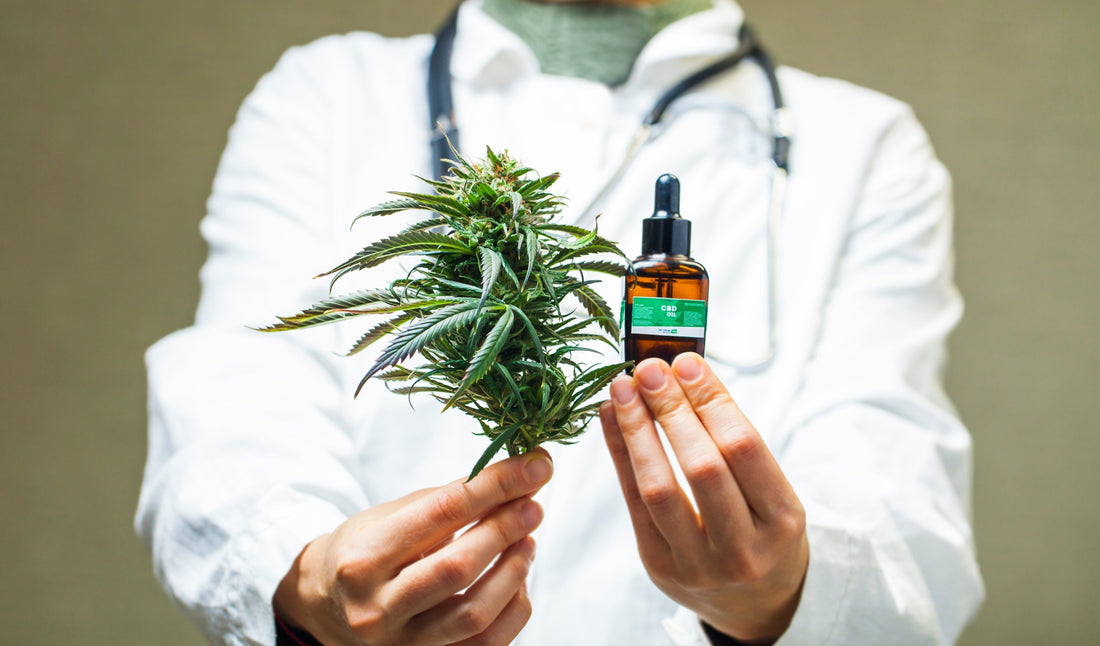CBD Oil and Melatonin For Sleep
CBD Oil
It’s no secret that the world has gone through a lot over the past two and a half years. Stress and anxiety are at an all-time high1. Overwhelming stress can lead to all kinds of health issues if it is not managed, and it can be difficult to relax at night if you’re stressed out during the day.
[products limit="1" columns="2" category="cbd-oil-zero-thc"]
If you’re one of tens of millions of people with sleep problems2, you know how much of a struggle it can be when you have to go through your day feeling unrested on top of being stressed. It can seem to become a never-ending cycle of feeling tired and not being able to recharge.
Fortunately, we live in a time conducive to progressive research of cannabis and its compounds, and there are promising preliminary data for the management of anxiety and sleep disorders with the incredible compounds found in cannabis. Yes, I’m talking about CBD, but other cannabinoids like THC also play a role in how cannabis or hemp affect your body.
Considering that sleep disorders affect up to 70 million Americans yearly, and insomnia symptoms occur in approximately 50% of the adult population, there seems to be a real need for better sleep3.
CBD vs. Melatonin
CBD and Melatonin are two widely-used supplements for sleep issues & now, CBD is available in gummy form, and the best CBD gummies for sleep continues to be growing in popularity. CBD has become increasingly popular since the passage of the 2018 Farm Bill, which legalizes hemp that contains no more than 0.3% THC on a dry weight basis.
One of the uses of the best CBD gummies for sleep, CBD has become so popular is Sleep. How does CBD compare to Melatonin for sleep? Let’s go over why they both may be beneficial for sleep quality.
What is Melatonin?
“Melatonin is a hormone that your brain produces in response to darkness. It helps with the timing of your circadian rhythms (24-hour internal clock) and with sleep. Being exposed to light at night can block melatonin production.”4
In the past decade, the use of melatonin has grown by over 500%5. It seems to be a relatively safe sleep aid when taken at small doses and for a short amount of time. However, in more recent years, the use of melatonin has been cautioned by health professionals.
In 2017, a study published in the Journal of Clinical Sleep Medicine found that melatonin content in supplements far exceeded the acceptable rate of the variability of the labeled content. With some supplements containing more than 400% of the advertised amounts6.
Many of the melatonin supplements studied also contained contaminants such as serotonin, a hormone that can have harmful effects even at relatively low levels, according to the National Center for Complementary and Integrative Health7.
Daytime sleepiness can be an unwanted side effect in individuals who have a reduced melatonin clearance rate, which is the rate at which a drug is removed from the body8. Especially if too much melatonin is taken, which could easily occur in a supplement containing much more than the labeled amount.
Melatonin may interact with other medications and can act as a blood thinner when taken in high doses9. If you take other medications, you definitely want to consult your physician before using melatonin.
CBD for Sleep: Does it work?
Research focusing on CBD suggests that your effects are based on the amount of CBD taken. To be specific, lower doses of CBD have been shown to be stimulating, while medium and high-dose CBD has been demonstrated to be sedating10.
Most studies that have researched the effects of cannabinoids like CBD on sleep have been conducted within the context of chronic pain conditions and suggest that a 1:1 ratio of THC:CBD has been associated with better sleep among patients with chronic pain11.
One study involving individuals with insomnia yielded results that suggested that the administration of 160 mg/day of CBD increased total sleep time and decreased the frequency of arousals during the night12. This is considered more of a therapeutic dose in today’s market, so if you are interested in taking this much CBD, it may be best to start at a lower dose and work your way up.
Since CBD has a positive potential for helping anxiety symptoms, it is theorized that CBD may also help with anxiety associated with insomnia. A new pilot study13 will examine the use of CBD and THC in humans with clinically-diagnosed Insomnia disorder. The results of this study will provide more clinical information on how CBD may help insomnia symptoms.
Should you take CBD or Melatonin for better sleep?
The answer may depend on your unique situation. You may want to try CBD Oil & CBD gummies for sleep as a way of helping promote a sense of calm, especially at bedtime. However, melatonin may be a good choice if you are someone dealing with a sleep/wake cycle-related issue.
Regardless of your choice, always consult with your doctor first before adding in a new supplement to rule out any contraindications or interactions if you are taking other medications.
We love to use CBD Oil & CBD gummies for better sleep to help calm feelings of anxiousness, which consequently may also help us get better rest at night. We consider this a win-win situation, which is why we recommend a high-quality Full-Spectrum CBD Oil in the morning to start your day, and an herbal-enhanced CBD Oil at night to help us drift off into a great sleep.
References
1 https://www.webmd.com/anxiety-panic/news/20220310/americans-report-overwhelming-stress-poll
2,3 https://my.clevelandclinic.org/health/diseases/12119-insomnia#:~:text=How%20common%20is%20insomnia%3F,at%2010%25%20to%2015%25.
4 https://www.nccih.nih.gov/health/melatonin-what-you-need-to-know
5,6,7 https://jamanetwork.com/journals/jama/article-abstract/2788539
8,9 https://www.healthline.com/nutrition/melatonin-side-effects#TOC_TITLE_HDR_5
10 https://www.med.upenn.edu/cbti/assets/user-content/documents/s11920-017-0775-9.pdf
11 https://pubmed.ncbi.nlm.nih.gov/17712817/
12 https://pubmed.ncbi.nlm.nih.gov/7028792/
13 https://pubmed.ncbi.nlm.nih.gov/32430450/
The statements herein have not been evaluated by the US Food and Drug Administration and any information herein is not intended to aid any reader in the diagnosis, treatment, curing, or prevention of any disease or other medical condition.
[/vc_column_text][/vc_column][/vc_row]

